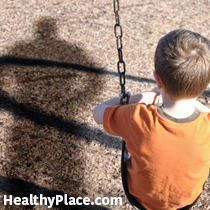Three Myths about Child Sexual Abuse
There are many myths about child sexual abuse but I'm going to focus on three (What Is Child Sexual Abuse?). Three myths about child sexual abuse are that all abused children tell someone, all victims of childhood sexual abuse have physical trauma, and all victims of childhood sexual abuse will grow up to become sex offenders. Let's take a closer look at these child sexual abuse myths.
Child Sexual Abuse Myth 1: All Victims of Child Sexual Abuse Tell Someone
We want to believe this because we've spent so much time educating our children about childhood sexual abuse. We encourage them to tell an adult if someone touches them inappropriately or makes them feel uncomfortable. But children telling an adult about childhood sexual abuse is the exception, not the norm. Most children don't tell for a variety of reasons.
 Children may lack the words to tell what happened to them due to age (I know of one case in which a two-month-old was raped), ignorance (I didn't know what was going on since I was four and had no concept of sex), or embarrassment. The offender usually convinces the child that he/she is to blame for the abuse. In addition, the offender may threaten to harm the victim, a loved one, a family pet, or even him/herself. Children may also know that going forward will lead to legal or other drama. I know of one molestation case where the victim stopped talking about his abuse because other children made fun of him as homosexual since a man had raped him.
Children may lack the words to tell what happened to them due to age (I know of one case in which a two-month-old was raped), ignorance (I didn't know what was going on since I was four and had no concept of sex), or embarrassment. The offender usually convinces the child that he/she is to blame for the abuse. In addition, the offender may threaten to harm the victim, a loved one, a family pet, or even him/herself. Children may also know that going forward will lead to legal or other drama. I know of one molestation case where the victim stopped talking about his abuse because other children made fun of him as homosexual since a man had raped him.
Children rarely tell, and if they do, it's usually not right away. Adult rape victims behave the same way, so why is it a surprise children have this attitude?
Child Sexual Abuse Myth 2: Sexual Abuse Victims Have Physical Trauma
Most childhood sexual abuse victims are not injured during the violation, especially when penetration is not involved. Offenders don't want to get caught, so they often go out of their way to avoid leaving physical marks. This myth perpetuates the belief that if it's not physically harmful, it's not abuse.
This is not to say there are no signs of trauma (Effects of Child Sexual Abuse on Children). There may be behavioral or emotional signs of trauma, but not everyone knows what these are. I know of one case in which a seven-year-old started dressing in a sexually provocative manner. My money was on sexual abuse, but her parents sent her to a behavior modification program. It takes an alert adult to recognize the signs, and, as a general rule, very few adults are alert outside the mental health profession (and, some argue, even then it's rare).
Many sexual acts leave no physical marks, but that does not mean nothing happened.
Child Sexual Abuse Myth 3: Child Sexual Abuse Victims Become Sex Offenders
I once was disqualified from a job because of this myth. According to the CALICO Center, however, only one-third of sex offenders who offended against children were victimized as children. Acting as if a childhood sexual abuse victim will grow up to become a sex offender further stigmatizes victims by telling them they're going to grow up to become what they hate. It prevents children from telling adults because of fear of punishment. And it re-traumatizes the victim by casting them in the light of an abuser (Twice Scarred: BPD and Secondary Wounding).
Most children who were sexually abused as children don't grow up to violate children. The fact that only one-third of all offenders were abused as children means the vast majority of offenders are perfectly "normal" people with no history of abuse. Offenders "groom" their victims to be submissive and do their best to appear respectable. CALICO reports that 95 percent of offenders are someone the child knows and trusts, and, in many cases, the parents also know and trust.
So that's three myths about child sexual abuse. What myths have you heard?
You can also find Becky Oberg on Google+, Facebook and Twitter and LinkedIn.
APA Reference
Oberg, B.
(2016, June 27). Three Myths about Child Sexual Abuse, HealthyPlace. Retrieved
on 2026, March 2 from https://www.healthyplace.com/blogs/recoveringfrommentalillness/2016/06/three-myths-about-child-sexual-abuse